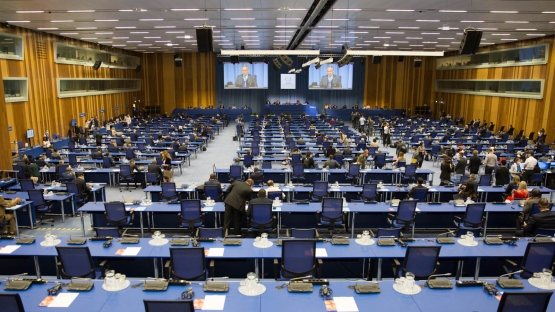The IAEA has maintained its safeguards implementation activities to ensure that nuclear material is not diverted from peaceful purposes despite the unprecedented disruption caused by the global COVID-19 pandemic, Director General Rafael Mariano Grossi said today.
“We continued to carry out all of our most time-critical in-field verification work, while rescheduling some less urgent activities, such as equipment installation and maintenance,” Mr Grossi told the IAEA’s 64th General Conference. “For the first time, we chartered aircraft to enable our inspectors to reach their destinations. I am grateful for the support of Member States that made this possible.”
The General Conference is the biggest annual meeting of the Agency’s 172 Member States. It normally attracts as many as 3,000 participants and many countries are represented at ministerial level. This year, numbers are greatly reduced because of the pandemic. Many countries are participating online.
Mr Grossi noted that the pandemic had forced a two-month lockdown during which virtually all Agency staff had worked from home.
“The 12 months since the last regular session of the General Conference have been unprecedented in the history of the Agency,” he added.
Nevertheless, the Agency mounted its largest-ever operation to help countries respond to the COVID-19 pandemic, shipping 1,300 consignments of equipment for virus detection and diagnosis and other supplies to 123 countries. Supporting countries in fighting the coronavirus would remain the IAEA’s top priority until the pandemic had been defeated, Mr Grossi said.
“COVID-19 will certainly not be the last pandemic which threatens the world,” he said. “I have therefore proposed a new IAEA Zoonotic Disease Integrated Action project, known as ZODIAC, to establish a global network of national diagnostic laboratories for the monitoring, surveillance, early detection and control of zoonotic diseases, using nuclear or nuclear-derived techniques.”
He urged Member States to support the ZODIAC project, under which countries will have access to equipment, technology packages, expertise, guidance and training. Decision-makers will receive up-to-date, user-friendly information that will enable them to act quickly in the event of a new disease outbreak. The IAEA will work closely with partners such as the World Health Organization and the Food and Agriculture Organizations of the United Nations.






